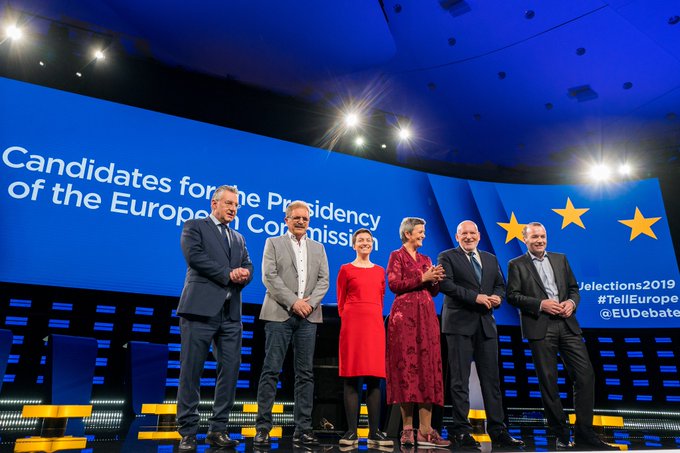
On 15 May the six candidates to the Presidency of the European Commission have met in the so-called “Spitzenkandidaten” debate – held in in the European Parliament’s plenary chamber in Brussels – expressing their vision on immigration, climate change, taxes and unemployment.
RECORDING OF MAASTRICH DEBATE 29 APRIL 29 APRIL (VIDEO)
RECORDING OF SPITZENKANDIDATEN DEBATE 15 MAY (VIDEO)
Who will replace Jean-Claude Juncker as President of the European Commission?
Probably the answer is in the list below, which contains the name of the candidates who represents the main Parliament groups that on 15th May participated in the traditional “Spitzenkandidaten” debate:
- Manfred Weber, European People's Party (EPP)
- Frans Timmermans, Party of European Socialists (PES)
- Ska Keller, European Green Party (EGP)
- Margrete Vestager, Liberals (ALDE)
- Nico Cué, European Left (PEL)
- Jan Zahradil, European Conservatives and Reformists (AECR)
While there is no guarantee that any of them will end up as President of the European Commission, they surely expressed the vision of their Party on the critical topics of our time and on where Europe should be headed in the next five years.
Strategies to fight climate change
All the candidates acknowledged that climate change is a serious problem that must be addressed and tried to give different solutions: while Vestager (ALDE) said we must invest on high-speed trains to disincentive the use of planes, Timmermans (PES) evoked a carbon tax for companies, almost aligning with Cué (PEL) who explicitly claimed the will to raise taxes for companies in general; Zahradil (AECR) instead focused on incentivizing biological agriculture.
During this round, Weber (EPP) was challenged by four out of five candidates on this topic; pressed by the questions, he strongly disagreed with Timmermans claiming that just raising taxes will not solve climate change: as environmental engineer, he said that the European Commission must heavily invest on both green technologies and innovation to really address climate change. In order to do so, each country must feel the urge to work together and find a common action plan to reach a maximum impact.
Immigration: the word “redistribution” is still at sea
In general, the candidates evoked a common European action to address immigration and expressed their strong disapproval for all those Southern Europe Governments who not only are against the rescue of migrants in the Mediterranean Sea, but even put sanctions on those ships that try to do it.
On the other end, all the candidates avoided talking about a common redistribution plan to put in motion in order to apply the frequently mentioned European spirit of solidarity.
Zahradil (AECR), moreover, was explicitly in favor on creating reception centers outside Europe and on signing agreements with the countries of origin to address immigration; Weber (EPP) instead was more cautious and just expressed his intention to appoint a Commissioner to oversee relationships with Africa to help control the phenomenon.
"Alexa, when Amazon is going to start paying its taxes?"
This is how Timmermans (PES) expressed his view on multinational companies that find ways to avoid paying their fair amount of taxes; he also added that there should be an 18% taxation on companies, giving the possibility to each country to increment the percentage but never going below this minimum threshold.
In fact, as one of the moderator pointed out, this is a topic that annoys many people across the continent, causing unfairness and injustice: why, he asked, citizens must be taxed between the 20 and 40% of their income while rich multinational companies pay only 5%?
All the other candidates generally agreed on finding a common fiscal justice in order to reach tax fairness in Europe, considering also the huge amount of tax evasion in the EU (€850 billion).
Youth and Unemployment
Zahradil (AECR) said that the European Commission can create the right economic environment but can not directly create jobs (this is a companies’ prerogative). His solution is not a standard policy adopted by the European Commission but rather customized solutions that each country should adopt considering its necessities.
Timmermans (PES) strongly rejected this view, claiming also to be in favor of lowering the age to vote for the European Elections to 16 years old citizens, the extension of the Erasmus programme to all young people and a minimum wage to protect them.
Finally, for Weber (EPP) the answer was focusing on trade (already 36 mln jobs in the EU depends on that), while for Keller (EGP) the right recipe was heavily investing in the Green Economy, creating in this way new jobs in this evolving context while protecting our Planet.
Vote, vote, vote!
In the final minutes of the Debate the moderators gave the possibility to each candidate expressed their last consideration. While making a recap of their party key topics, each one of them strongly invited the citizens to vote in the next European elections.
In particular, Timmermans (PES) directly addressed the citizens and made a bipartisan plea while concluding his speech: “Whatever you choose, never become indifferent: choose. Let your voice be heard. If you don’t vote, somebody else will take your voice”.
So, EU citizens, on 23-26 May let your heart speak and go vote, because the future of Europe is more than ever in your hands.
